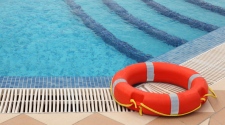A session of swimming leaves us rejuvenated and no matter how sore we feel physically, there is a freshness that surrounds us right from the moment we come out of the pool. However, the feeling is not so pleasant for all because several swimmers are left with a stinging and burning sensation around their eyes, which is quite uncomfortable. In fact, the problem is so common among even the avid swimmers that it is popularly termed as, “swimmer’s eye”. If this rather commonplace trouble is making you apprehensive of receiving Richmond swim lessons or making you too cautious about the chances of any harm to the eyes, it is time to understand how exactly does swimming affect your eyes. And the good news is that there are ways you can prevent suffering from the unwanted eye irritation problems. So, let’s get started.
The Effect of Pool Chemicals on Your Eyes
A pool used by humans needs to be disinfected from time to time and this is done by means of chemicals such as chlorine and saline. Now, these chemicals have harmful effects on your eyes in the sense that they cause the water from your tear film to evaporate. Since this tear film helps in keeping your eyes lubricated, the evaporation leaves the surface of your eyes non-lubricated and therefore, exposed to various other chemicals and bacteria in the pool. Apart from this, chlorine in the pool water causes major irritation in the eyes leading to a condition called chemical conjunctivitis. Swimmers often suffer from this inflammatory condition, the symptoms of which include itching, redness, irritation and watering of the eyes.
There are certain ways you can avoid suffering from the harmful effects of the pool water chemicals. While wearing goggles every time you swim is the best possible protective measure, rinsing your eyes with fresh water while showering after a swim session is an essential way of removing traces of chlorine deposited around the eyelids and lashes. If you have particularly sensitive eyes, consider using the lubricating eye drops available out there. These drops offer immediate relief in the short run and work towards restoring the composition of your tear film in the long run.
Suffering from the Dry Eye Syndrome
Dry eyes, too, is a common eye problem leading to redness, irritation, gritty sensation in the eyes and even blurred vision if the problem is acute. While dry eye syndrome can be caused by several other reasons also, swimmers are often found complaining of developing the syndrome or a worsening of the problem. The condition is likewise caused mainly by the harmful pool chemicals, though in the case of dry eye syndrome, the effect is all the more disastrous with the tear production getting reduced beyond normal and the tear film evaporating too easily because of chemical instability. The eyes can get dry to an extent that is actually threatening.
Dry eyes can be prevented by wearing goggles. However, in order to ensure that the problem doesn’t get too serious, swimmers should use artificial teardrops before putting on their goggles. This gives their eyes an extra layer of protection. Additionally, you should always stay well hydrated both before and after a swim session as this helps in maintaining the vulnerable and sensible aqueous layer of the tear film.
Swimming with Contact Lenses
Swimmers suffering from nearsightedness or farsightedness prefer to swim wearing their contact lenses. Also, contact lenses are supposed to prevent your eyes from the irritation and redness. But on the flipside, wearing contact lenses in the water can actually bring a lot of harm to your eyes. The lenses are like scaffolding for the pool chemicals and often become the breeding ground for bacteria. Research reveals that microbial growth starts showing on the contact lenses just after one swim. Hence, contact lenses offer long drawn exposure of your eyes to the water bacteria and chemicals and in the future, can lead to acute problems like a corneal ulcer or even vision loss. Contact lenses, being brittle in nature, get soft under water causing discomfort to the swimmer.
If wearing contact lenses is a must for you, make sure wearing the daily disposable lenses that require no maintenance. The best option is to get a prescription swimming goggles that are available at optical shops.
















